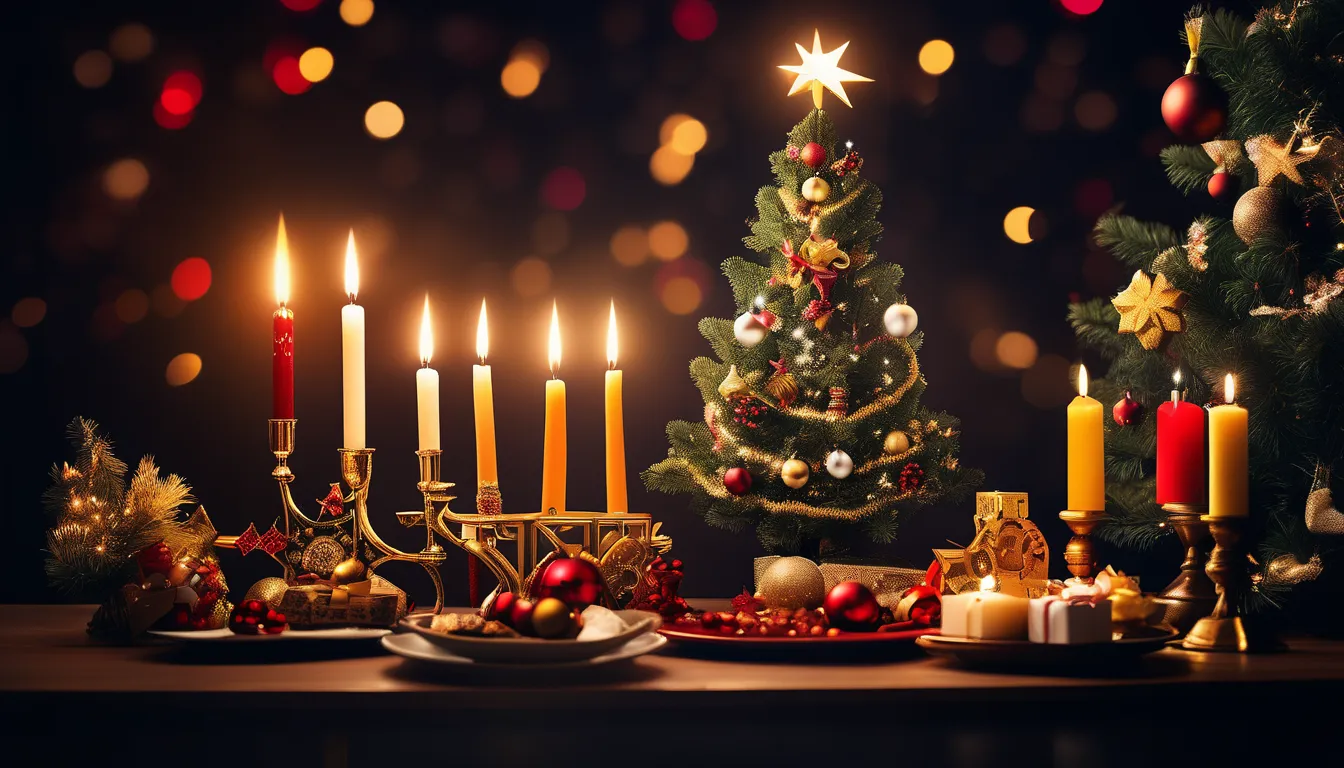As the year winds up, December has turned out to be a month for diverse cultural, religious, and seasonal celebrations all over the world. From religious observances, family reunions, and festive events, December comes to be a period when people from different walks of life find themselves rejoicing and celebrating together at one time but reflect on what happened the previous year and usher in new beginnings. From the sobriety of Hanukkah to the exuberance of Christmas, December’s global holidays feature a fascinating array of customs and meanings.
1. Christmas, 25th of December- Christ and Generosity
Arguably the most popular holiday in December, Christmas is famously commemorated by millions around the world. For Christians, it marks a day of Jesus Christ’s birthday-an occasion significant enough to the level of their spirituality. Christmas is therefore noted through practices such as the church services, family meals, gift-giving, and public ones. Some of the traditions include decorating of Christmas trees, singing of carols, and gift exchange that symbolize joy, hope, and goodwill.
However, beyond its religious origins, Christmas has become a secular celebration of love, kindness, and generosity. New York, Berlin, and countless other cities highlight spectacular displays while markets selling homemade gifts, mulled wine, and holiday treats attract all faiths and backgrounds. In Latin America, many countries celebrate “Las Posadas,” commemorating Mary and Joseph’s search for shelter; in Italy, the “Feast of the Seven Fishes” is an important part of the Christmas Eve dinner.
2. Hanukkah (Varies, December) – The Festival of Lights
It is the Festival of Lights, marking December among Jewish communities around the world, but the dates are different because they are determined from the Hebrew calendar. Hanukkah commemorates the miracle when the oil burned for eight days on just that one day’s amount of oil after the rededication of the Second Temple in Jerusalem.
The holiday is characterized by the lighting of the menorah, with one additional candle lit each night for eight nights. Thus, families attend to prayers and engage in singing traditional Hanukkah songs as well as in exchanging gifts. Fried-in-oil foods are staples during Hanukkah, which include latkes- potato pancakes and sufganiyot-jelly-filled doughnuts. Although not as universally viewed as Christmas, Hanukkah is desperately loved in the Jewish cultures as the celebration of family and faith.
3. Kwanzaa (December 26 – January 1) – A Celebration of African Heritage
Kwanzaa is a weeklong celebration beginning on December 26, immediately after Christmas to January 1. The creator of Kwanzaa is Dr. Maulana Karenga, who in 1966 conceived of this holiday as an expression of African heritage and culture, based upon the traditions of African-American people in the United States. This is a non-religious event that hearkens unity, self-determination, collective work and responsibility, cooperative economics, purpose, creativity, and faith.
Each of the seven days of Kwanzaa focuses on one principle, demonstrated by lighting a candle on the kinara. The celebration features family reunions, banquets, singing, and gift-giving. The holiday incorporates traditional African art, dress, and food, making the event a vibrant and culturally significant African-American celebration.
4. Festivus (December 23) – A Quirky Modern Tradition
In fact, there has recently emerged a kind of cult surrounding the holiday of Festivus, made famous by the TV show Seinfeld. Observed on December 23rd, the Festivus holiday is a semi-humorous and satirical holiday following an undoubtedly commercialized Christmas season. The holiday also has its own “traditions,” like the “Airing of Grievances,” where people air their grievances at each other, and the “Feats of Strength,” which traditionally ends in wrestling. The pole, which is the central focus of Festivus, in its simplicity is not gaudy, but is rather plain, to the point of being bare, constructed of aluminum.
Festivus, although few people celebrate it in a traditional format, is gaining popularity. This is saying something about the need for a playful, non-commercial way to present the holiday season. Many relish in the fact that Festivus provides a lighthearted way to “get off” holiday pressure and poke fun at the commercialism of Christmas.
5. Boxing Day December 26 Boxing Day- A holiday of Charity and Sport
Boxing day is a holiday in countries like United Kingdom, Canada and Australia observed the day after Christmas. Historians debate its origin, but many believe it stems from medieval England, where people gave alms in boxes. Boxing Day now features post-Christmas sales, like Black Friday in the U.S., but retains its charitable origins.
Besides shopping, sports events also form part of Boxing Day activities. Some soccer events occur in the UK and cricket matches in Australia. Families spend Boxing Day indoors, enjoying sports, volunteering, and engaging in activities that contribute to the community.
6. St. Lucia Day on December 13th: A Scandinavian Celebration of Light
People celebrate St. Lucia Day on December 13th, marking the start of Christmas celebrations in Scandinavian countries. People mainly observe St. Lucia Day in Sweden, Norway, and Finland, particularly in specific regions. It honors Saint Lucia, an early Christian martyr who, legend says, helped persecuted Christians during winter’s darkest days.
White-robed girls with red sashes walk in procession, crowns of candles. These can be electric for safety, and the procession is usually led by a girl who personifies St. Lucia. Families enjoy traditional treats like saffron buns and baked goods, accompanied by singing festive, traditional songs. St. Lucia Day celebrates light and hope. It falls at the darkest time of the year in the Nordic countries.
7. New Year Celebrations Global Celebrations for the New Year In December and January (December 31 – January 1)
As December is coming to an end, the arrival of a new year is, however celebrated all around the world. Big parties, fireworks, and family gatherings mark New Year’s Eve celebrations in the United States, Canada, and Europe.
In Japan, New Year is the most important holiday, with people returning home, visiting shrines, and enjoying sech. In the Philippines, people celebrate with fireworks, drums, shouting, and noise to drive away evil spirits and welcome prosperity.
Conclusion
People around the world celebrate December holidays, embracing rich traditions from diverse cultures, religions, and histories. Whether solemn or festive, December holidays unite us through shared values of community, generosity, and hope. These holidays remind us that, despite our differences, we form one global family united by traditions that bring joy and warmth.







